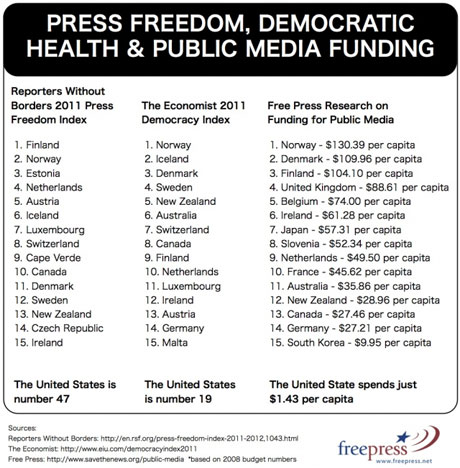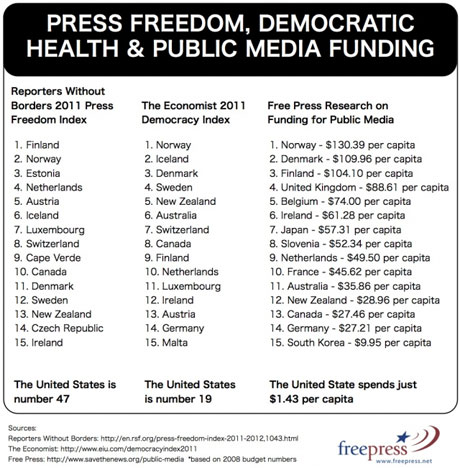This week Reporters Without Borders released its 2011–2012 Press Freedom Index, and much of the attention has focused on the fact that the United States has dropped 27 places to 47th in the world, thanks in large part to the journalist arrests at Occupy Wall Street events. For a nation that has built its model of governance on freedom of the press, that ranking should be a wake-up call, and should spark a national debate about how we are going to defend the First Amendment in the digital age.
On its own, the study from Reporters Without Borders is a powerful snapshot of press freedom around the world. However, it’s worth cross-referencing the report’s findings with a few other data points to better understand how the United States stacks up, and why this ranking is so important. When the lists below are viewed side by side, it becomes clear that press freedom correlates directly with other measures of democratic health.
But it’s the next line of Jefferson’s quote that we should pay particular attention to. “But I should mean,” Jefferson continues, “that every man should receive those papers and be capable of reading them.” It’s not enough to have a free press if people cannot access it, or if someone does not have the requisite literacy to consume and use the information it supplies. This is where the last column in the chart above comes in.The two data sets on the left will likely surprise no one. Many of the countries that top the new list from Reporters Without Borders also top the Economist’s Democracy Index, which evaluates nations on the basis of the functioning of government, civic participation, civil liberties, political culture and pluralism. When comparing these two lists, it becomes clear that a free press helps fosters a stronger democracy, an idea Thomas Jefferson understood well when he wrote, “were it left to me to decide whether we should have a government without newspapers or newspapers without a government, I should not hesitate a moment to prefer the latter.”
The list on the right ranks countries in terms of their investment in public media. Around the world, nations have invested in public broadcasting as a way of serving all people, which means ensuring that vital news and information, arts and educational programming are universally available and accessible. Many of the countries with the most substantial investment in public media also figure prominently in the other two lists featured here.
Taken together these lists suggest a connection between a strong public media sector, strong press freedom and strong democracies. In every case, the United States lags far behind other democratic nations. In recent years, the United States has dropped on both the Economist and Reporters Without Borders lists.
But these are not the only data points we can cross-reference. In their book The Life and Death of American Journalism, Robert McChesney and John Nichols point out that Freedom House, an organization that advocates for democracy and human rights, routinely ranks Northern European nations with the most significant press subsidies on the top of its press freedom list. McChesney and Nichols note that many of these nations also top the pro-business Legatum Group's Prosperity Index, “which measures health, individual freedom, security, the quality of governance and transparency, in addition to material wealth.” This year the United States ranks 10th.
We should all be concerned about the steep decline in the United States ranking for press freedom, and we must address the escalating conflicts between police and the press, especially as we enter an election year. However, if we want to rebuild a strong free press in America, we must also consider how we invest in that core value as a nation. Congress should not be debating cuts to public broadcasting; it should be exploring how we can invest in critical information infrastructure that will meet Jefferson’s challenge — to foster a truly free press that is accessible and serves all people. In that regard, we have a long way to go.
Angry, shocked, overwhelmed? Take action: Support independent media.
We’ve borne witness to a chaotic first few months in Trump’s presidency.
Over the last months, each executive order has delivered shock and bewilderment — a core part of a strategy to make the right-wing turn feel inevitable and overwhelming. But, as organizer Sandra Avalos implored us to remember in Truthout last November, “Together, we are more powerful than Trump.”
Indeed, the Trump administration is pushing through executive orders, but — as we’ve reported at Truthout — many are in legal limbo and face court challenges from unions and civil rights groups. Efforts to quash anti-racist teaching and DEI programs are stalled by education faculty, staff, and students refusing to comply. And communities across the country are coming together to raise the alarm on ICE raids, inform neighbors of their civil rights, and protect each other in moving shows of solidarity.
It will be a long fight ahead. And as nonprofit movement media, Truthout plans to be there documenting and uplifting resistance.
As we undertake this life-sustaining work, we appeal for your support. Please, if you find value in what we do, join our community of sustainers by making a monthly or one-time gift.

